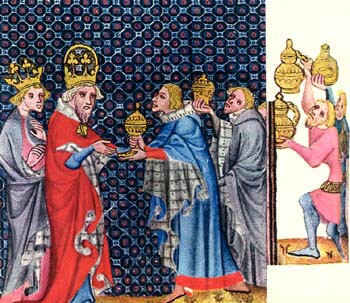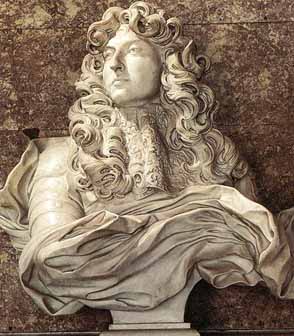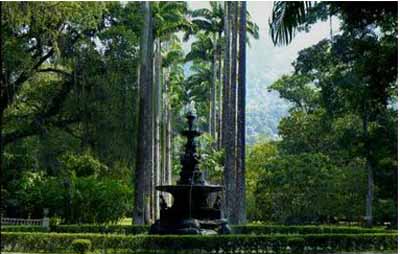 |
Organic Society
The Art of Organic Government
Plinio Corrêa de Oliveira
An organic government is, on one hand, extremely honorable, prestigious, respected and feared with the capacity to impose measures, when necessary, to accomplish what needs to be done. On the other hand, it is very aware of its own limitations and understands that should the suspicion grow that it wants to absorb the organic life of the regions and exploit the people – instead of coordinating and presiding over them – it would face the resistance of the whole social body.
Napoleon, who was the opposite of an organic governor, committed one of his great political errors when he tried to impose himself and the ideas of the French Revolution on Catholic Spain. The Spaniards rose up against him with such a strong and general resistance that no military power could curb it; no authority could govern a country in that condition. He had to leave Spain.
As a stimulus to only govern in an organic way, the good leader keeps in mind that the people can react against him. Organic government is achieved more by influence than by direct commands.
To influence is to meet expectations
How does one influence public opinion in a society composed of clans? One must understand that the stimulus of society starts from the lower levels and moves toward the higher ones. A leader must carefully observe whether a stimulus is born in the lower levels, as it should, and if so, then assist its organic growth. He should avoid taking advantage of his office and prestige to artificially change the direction of a society. Thus, we see that the role of the one who governs is more a pedagogical action to assist the good tendencies sprouting at the base of society than an artificial imposition of new rules.

To govern is to orient the good tendencies of the people |
This way of governing is incomparably more efficient and vital than despotically ruling the State in any form of government - monarchical, aristocratic or democratic.
I know that this is not an easy job. First, it demands great discernment on the part of the leader, and then, an ability to adapt to the uncountable complexities present in the social fabric.
Let us look at the expectations of a family in an organic Catholic society. If the family loves the sublime, that is, it always aims for what is more perfect and tends to model life on earth as an image of life in heaven, then the expectations of the parents and, vice-versa, those of their children intermingle, influencing both those who command and those who obey. The parents adapt themselves and try to fulfill the expectations of the children, and the children do the same in order to live up to the expectations of their parents.
For example, rather than give a direct command to his young son, “You must prepare yourself to follow the same path I did and give continuity to our family,” the father simply expects that the child will follow his path, without the need to say it. Every advantage lies in the latter way: The child is not obliged to take that path; he is free to follow other inclinations God put in his soul; he does not experience trauma should he not follow his father’s suggestion, and his father does not suffer an unnecessary loss of authority. In either case, the harmony of the family is preserved. The upright child is always open to fulfill the expectations of his parents.
Also, children have expectations that the parents should discern. Without having to complain that their house should be clean and ordered as well as possible so that they can invite their friends to visit without embarrassment, the children have natural expectations that this should happen. It is up to the parents to meet those expectations.
The same kind of mutual expectations that are met inside a family between parents and children also take place between the king and his people. The people have certain expectations of their king that influence his action, and the king has expectations of the people that influence their lives as well. This interaction of expectations plays a special role in the life of a country and is an important part of an organic government.
If we want to objectively understand Kaiser Wilhelm II - I am reading a book written by the governess of his daughter - we have to realize that many of the airs he assumed and attitudes he took were to fulfill the expectations of the German people of his time.
The King, the apex of the natural order

Louis XIV by Bernini |
In his Treatise of Natural Law, Taparelli d’Azeglio teaches that since inequalities naturally exist among men, once a society is constituted a nobility naturally forms, like a coral bank forms in the sea rocks. The nobility, in its turn, normally generates its own pinnacle, which is the king. In the temporal order, the king is thus the reflection of what is most excellent in a society.
Notwithstanding his infidelity, Solomon was the prototype of a man and of a king; for this reason he represented the height of Israel’s glory, as Scripture tells us.
Louis XIV, also an unfaithful King, nonetheless in some way repeated the glory of Solomon in the New Testament. He did not follow the command of Our Lord to consecrate France to His Sacred Heart; he persecuted St. Louis Grignion de Monfort, who should have been his counselor and ordered the destruction of a Calvary (1) that the Saint built in the French countryside. As we know, he also committed many other infidelities. Notwithstanding he expressed sovereignty in History as no one else did. We can say that he brought the notion of sovereignty to its very apex. If he had been faithful and governed in an organic instead of absolutist way, one can hardly imagine the excellent pages of History he would have written.
From where does the first influence come: the people or the elites?
Should the influence in society travel from the bottom to the top? Or from the top to the base? I believe that one means of influence does not necessarily exclude the other. Usually Divine Providence acts in both ways simultaneously.
When Divine Providence wants to act in a place, usually it prepares the people to receive the gift of faith and sublimity. At the same time, there is also a person among the elite who receives the sparkle of the sublime. Then, that person touches the people and the interaction of influence begins. It is not so important to know where it starts as to realize that such preparations are usually simultaneous.
We can find an example of how the bottom influences the top took place during the religious wars in France. Even though we can praise the role of the noble House of Guise in the fight against Protestantism, if the little people had not been very, very Catholic, France would have become Protestant. It was not just an action of the elites that stopped this movement.
When Henry of Navarre, who was a Huguenot, falsely converted to Catholicism, he did so not because of a demand of the nobility. The latter knew well his conversion was a sham and did not care. He became Catholic to fool the little people who imagined he was sincere and would only accept a Catholic as King of France. When Henry of Navarre became Henry IV with his famous line, “Paris is well worth a Mass,” he spoke those words to the nobility…
This episode is an admirable example of how the light of the faith and sublimity could remain in the little people even after they had left the mountain of faith and sublimity where they dwelled in the Middle Ages.

Partial view of the row of palm trees in the Botanical Garden, Rio de Janeiro |
An example of how the top influenced the bottom can be seen in the stay of the King of Portugal in Brazil in the early 19th century. When Don João VI (1) planted that majestic and soaring row of palm trees in the Botanical Garden in Rio de Janeiro, he helped to define some traits of Rio’s physiognomy, and, through Rio, all of Brazil. It was a modest action, to plant that aisle of trees in the Botanical Garden, but it had a strong formative effect at that time. There is something too luxuriant and exuberant in Brazil’s tropical flora that the landscaping of those palm trees compensates and rectifies.
This kind of action of the monarch is in many ways more profound and important than to sign laws and decrees. It shows the role of the monarch discerning the needs of the people. It is a kind of spiritual leadership of the king.
1. In Bretagne, France, a traditional devotion is to build Calvaries, ensembles of sculpted stone figures representing the Crucifixion of Our Lord. Everywhere that St. Louis Grignion de Montfort preachedd, he promoted the sculpting of a Calvary. For more in French read here
2. The King of Portugal who went to Brazil (1808-1821) and raised it to a United Kingdom with Portugal.

Posted October 4, 2010

  | | Prof. Plinio |
Organic Society was a theme dear to the late Prof. Plinio Corrêa de Oliveira. He addressed this topic on countless occasions during his life - at times in lectures for the formation of his disciples, at times in meetings with friends who gathered to study the social aspects and history of Christendom, at times just in passing.
Atila S. Guimarães selected excerpts of these lectures and conversations from the trancripts of tapes and his own personal notes. He translated and adapted them into articles for the TIA website. In these texts fidelity to the original ideas and words is kept as much as possible.

Related Topics of Interest
 A Participative Society A Participative Society
 What Is the Res Publica? What Is the Res Publica?
 How Intermediary Societies Participate in the State Power How Intermediary Societies Participate in the State Power
 Organic society and the Desire for Heaven Organic society and the Desire for Heaven
 The Organic Formation of a Region The Organic Formation of a Region
 All Classes Should Have Elites All Classes Should Have Elites
 Leadership Is Established by Generosity and Gratitude Leadership Is Established by Generosity and Gratitude
 Clans and Human Types Clans and Human Types

Related Works of Interest
|
|
Organic Society | Social-Political | Home | Books | CDs | Search | Contact Us | Donate

© 2002-
Tradition in Action, Inc. All Rights Reserved
|
 |
|